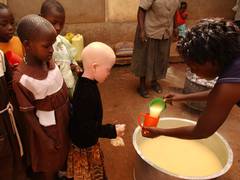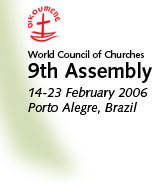 |
WCC > Home > News & media > Features | ||||
| About the assembly | Programme | Theme & issues | News & media | |||||
 |
|
||||
|
03.11.05
The ways of God's grace "(...) just as God visits the sick, we too must visit the sick." "God, in your grace, transform the world" is a prayer that, in principle, could express the yearning of people from different religions. In the following article, Rabbi Naamah Kelman from Jerusalem reflects on the theme of the upcoming World Council of Churches 9th Assembly from the point of view of the Jewish tradition. We look to God for the strength, wisdom, and courage to change the world. We pray to God to renew our hope and nourish our spirits so that we might be able to be partners in transforming the world. We reach to God to feel love and comfort, so that when we have failed to change our world, we might be able to try again. We, of the three monotheistic faiths - Judaism, Christianity, Islam - share a God of compassion and justice. And these two must go together. Compassion without justice may heal us, but will not mend nor move us toward where we need to go. Justice without compassion might fix the wrong, but will not give us the ability to hold on to each other. We serve a God who can move us, heal us, inspire us, and compel us. In the Jewish tradition, we cling to two key pillars that hold us up. They are creation and redemption. Creation is both the original act of the creation of the world, and the ongoing idea of renewal; renewal of the soul and renewal of the world. Redemption is the original act of exodus from slavery, and the ongoing hope for a redeemed world. While God is the source for these transformative powers, we must become partners with God to ensure the ongoing forces of renewal and redemption in the world. On the weekly sabbath, these two forces are brought together. We are commanded to rest, not to relax, in order to find the energies to return to a new week and the world with the force of creation and redemption. Maybe this week, we can heal our family, community, and neighbourhood. Even better, maybe we can reach out beyond our familiar frameworks and seek the other. Has there ever been a time in human history that we did not yearn for God's grace? Do we need it as much as ever? Yes! Today the scale of events is terrifying. Global connections have turned us into a world village. But technology has unleashed healing powers and powers of destruction as never before. We cannot keep up with the amount of terrible catastrophes facing humanity. It makes us numb with fear. Yet we also feel helpless in the face of poverty, disease, violence, and corruption. God's grace fights despair! The audacity of acting like God The theme of the 9th Assembly of the World Council of Churches next February reminds me of that wonderful Jewish parable about how we must act like God. Of course as soon as the rabbis say this, they gasp at their audacity. How can we humans be like God? So they answer: just as God visits the sick, we too must visit the sick. We learn this because God "appears before Abraham" in Genesis 18, shortly after he underwent circumcision. So the rabbis deduce that Abraham is recuperating and God has come to "call". The rabbis seek scriptural proof-texts that God feeds the hungry, clothes the naked (Adam and Eve in the garden), consoles the mourners, etcetera, and therefore, we must walk in God's ways. These are the ways of God's grace. Of course, the most powerful proof-text comes from Genesis 1:27. The text makes it very clear that we were created in God's image, all of us. I must treat you as if you represent God's image on earth. But no one has a monopoly on suffering, just like no one has a monopoly on holiness. We join hands as God's representatives on this glorious earth. So indeed, we start with those near us in pain and suffering, and we spread our work. Justice according to our prophets is also our mission. Care for the orphan, the widow, those most helpless in our societies. Build an equitable world. We turn to God in prayer and in action to fill the world with God's grace. Let us renew creation every day; let us bring redemption closer in every way. (*) Naamah Kelman, the first woman rabbi to be ordained in Israel, is director of educational initiatives at the Hebrew Union College in Jerusalem and board member of Rabbis for Human Rights. She is also active in the areas of religious pluralism, Jewish feminism, peace and inter-faith work. |
|||
|
|
|

